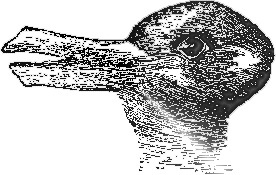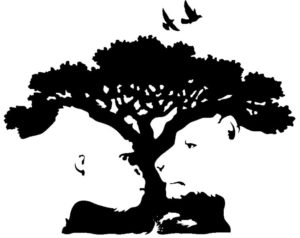We experience the world through the interplay of our perceptions and actions. What we can or cannot perceive, what we can or cannot do, shapes the ways in which we engage with and what we experience as reality. Our experience of this reality reflects our abilities. We may have needs, desires, seeking to satisfy them somehow, but without knowledge, without abilities, we have no clue how to direct our activities to fulfill these wants. These abilities are the result of hard work, a long process of learning and cultivation, and can change through additional learning and hard work.
If I go into a forest expecting to find something to eat, I must be able for example to differentiate edible plants from the rest, my senses tell them apart from among the rest. It is this ability, acquired through prior trial and error, through apprenticeship and training, that reveals these plants to my eyes, my hands, my nose, my mouth, as edible.
If instead I go into a grocery store, a different constellation of abilities is necessary: I need to read labels off packages, know what these labels refer to, how tasty and nutritious the packaged contents might be, and I need to know how to pay. This might seem trivial after we get the hang of it, but don’t we remember, as kids we were taught how to purchase things, and we come across the learning phase even as adults, when we go to a foreign country or when new products or novel ways for paying appear.
For us to experience, to perceive and act, we must be able to discern and foreground specific features of reality, while backgrounding others. To illustrate this point, I have found what is referred to as “gestalt pictures” very helpful.
 We see the picture on the left as either a rabbit (ears pointing left) or as a duck (beak pointing left). We have been taught to recognize rabbits and ducks, and we switch between viewing the picture as either. But what if we did not know about ducks? If we had never seen one, in flesh or in picture, and nobody had taught us to recognize it? If we only knew about rabbits, it would be only a rabbit that we could possibly see in the picture, it would be the only thing we would recognize.
We see the picture on the left as either a rabbit (ears pointing left) or as a duck (beak pointing left). We have been taught to recognize rabbits and ducks, and we switch between viewing the picture as either. But what if we did not know about ducks? If we had never seen one, in flesh or in picture, and nobody had taught us to recognize it? If we only knew about rabbits, it would be only a rabbit that we could possibly see in the picture, it would be the only thing we would recognize.

Similarly, on the left, we see a tree with birds flying over it; but we can also see – if we switch foreground and background – a gorilla and a lion. Again, if we had not been taught to recognize gorillas or lions, we could not possibly see them in the picture. The range of our perceptions is limited by our knowledge.
We all become acutely aware of this dependence of our experience of the world on our abilities whenever we learn something new. For example, with a new language, when we slowly learn to recognize the script and the sounds and comprehend them as meaningful text and utterances. When we learn how to use a new tool, how to hold it, what sound it makes when used properly or improperly. Or when we taste a new dish or drink, learning to distinguish the different flavors.

Would you please help me clarify the meaning of experience?
The two examples, forest and grocery, refer to interactions with the external world.
What about experiences resulting from interactions of concepts inside the mind. Do you call them experiences?
N
This is an interesting and important point.
At the outset, when we consider “interactions of concepts inside the mind,” these are not taking place in a vacuum. The body within which that mind resides is present in the material world. Where is that body, what is it doing? Is it resting? Is it walking? Is it enjoying a beautiful scenery? Or sitting in front of a computer? Has it eaten, is it thirsty, or has it fasted in preparation for such interactions?
Going further, where have these concepts inside the mind come from? A mind within which concepts interact is not an empty canvas. That mind’s body has a history of interactions with the material world, it is through those interactions that these concepts have formed, they reflect the body’s, the mind’s past, its wants, its hopes.
Now, the sensations of the body do not arise only from the “external world.” There are sensations from muscles and joints (proprioception) and the viscera among others. We might refer to them as “internal,” but in my view the internal/external boundary may not be as clear-cut as we usually take it to be – hence my use of quotation marks. I do plan to bring up some illuminating, for me at least, examples about different ways of demarcating this internal/external boundary.
So, to answer your question, yes, interactions of concepts within the mind (always inside the material body), are experiences. What you might be after is the stabilization of experiences, which I am also planning to address down the road.
Yiannis,
It is very interesting to explore where the mind stops and the rest of the world begins. However, as a professor with teaching excellence distinctions, you always reduce complexity in order to make decisions about how to teach.
So, I have two questions:
What are the practical implications of your internal/external demarcation on teaching and curriculum?
How does this demarcation relate to the bounded rationality, and therefore the docility in accepting information and advice, of students?
Thanks!
Not so fast. The internal/external boundary relates to our sense of what is under our control and therefore our responsibility, how we are expected to conduct ourselves, and, of course, what, who we are after all.
Teaching and curriculum are part of formal educational institutions, which are directly relevant to the production and reproduction of social organization – with its obvious significance for our everyday lives. Education is part of our socialization, imparting to us the abilities through which we perceive the world and act.
I do not find students docile. Indifferent sometimes perhaps, yes. But any indifference on their part I see as more of a comment on how they perceive the relevance of what we teach.
Before you ask the questions you are asking, we first need to put on the table what we and our societies look like, then ask the students what they think about it.
I feel that knowledge guides, manipulates, the experience. Before knowledge interfering, we are obliged to discover, our perception is free for the first conception of everything, according to one’s unique temperament and basic chracteristics.
I have difficulty imagining the experiences of a body without knowledge. How would it perceive, how would it act?
I fully share the sentiment expressed in your statement “that knowledge guides, manipulates, the experience.” But knowledge does not interfere, it is on the basis of knowledge that we experience, without knowledge we do not experience. But the sentiment of being manipulated persists, because, yes, in a very concrete sense our bodies have been colonized by certain kinds of knowledge. This colonization is important as it allows the coordinated mobilization of our bodies to support life in a group, a community, a society. But it also brings up the question of emancipation.
So what to do? Knowledge colonizes us, but is also the means for living in the world. This tension is central to this blog and my reason for wanting to provide a sense of where we stand, a map, and what tools we can use for orientation, a compass. Because, importantly, we can change.
I must look more carefully for what you mean by ”knowledge”. I think I understood this meaning differently. Because I had in mind that first came the experience and then the knowledge through experience (we would not search for the stars if not seen them first, is what I mean ). Ofcourse I accept the knowledge in our DNA, through the evolution of the generations. But ”as the means of living in the world”, in societies, I find it manipulating the experience. And I keep your saying ”we can change”
This is an important point and probes the boundaries of what we mean by knowledge. Without knowledge, our experience of the world is formless, unstructured. We see, yes, we hear, yes, but what? When we look up in the night, we see, yes, but we just see. To see stars, someone has taught us, or we have taught ourselves to discern them. This is what I tried to get across with the gestalt images in this post. If we know of neither rabbits nor ducks, the first image is a jumble to us, we see, we look for patterns, but we do not see something. Without knowledge the world is Rorschach images to us. It is through active interaction with our environment and socialization that we begin to pull different experiences together, discern patterns, structure our experience, organize it into discernible objects and activities, develop abilities, acquire knowledge.
What you seem to be referring to as knowledge is at the level of reflex arcs, what we are more or less born with – and is really very rudimentary. For example, when my hand touches the hot stove, it withdraws; in bright light, my pupils constrict. These are reflexes that we are born with – or they develop within the first year after birth or so. They are there even if we are unconscious. Are they knowledge? I don’t think it matters what we call them. But I can train myself to hold my hand in place when it touches the hot stove, and that is something different from just the reflex arc, and this kind of distinction is important.
We are born with a bundle of reflexes, with dispositions and potentialities. It is on this substrate that we organize our perceptions and actions, acquire abilities and knowledge through guided interaction with our environment. The substrate that we are born with is too rudimentary by itself – think of infants – but it does carry a tremendous potential. It is this potential that unfolds as we mature and at the same time is shaped through socialization, providing the abilities and knowledge through which we experience the world.